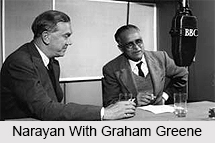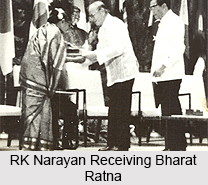 Considered to be one of the most versatile writers of Indian Literature in English, R K Narayan made India accessible to the readers in foreign countries. With a vast range of themes and subjects in his work, Narayan shows the way in which the people of India have been changing with time. He provides people with a window to peep into the sense and sensibilities of the Indian people (especially South Indian people). He has often been compared to the great American author William Faulkner because of his simple and modest writing. He is usually remembered for the invention of Malgudi, a semi-urban fictional town in southern India where most of his stories were set.
Considered to be one of the most versatile writers of Indian Literature in English, R K Narayan made India accessible to the readers in foreign countries. With a vast range of themes and subjects in his work, Narayan shows the way in which the people of India have been changing with time. He provides people with a window to peep into the sense and sensibilities of the Indian people (especially South Indian people). He has often been compared to the great American author William Faulkner because of his simple and modest writing. He is usually remembered for the invention of Malgudi, a semi-urban fictional town in southern India where most of his stories were set.
Early life of R.K Narayan
R K Narayan was born in 1906, in a working class South Indian family. Because his father had a transferable job, he used to stay under the constant care of his grandmother, Parvati who had taught him arithmetic, mythology and Sanskrit. He also attended many different schools in Chennai like, Lutheran Mission School, Christian College High School, etc. He was interested in English literature since his childhood. Later in his works, he had also created the famous Albert Mission School (a fictional name). After going to Mysore, Narayan had developed his habit of reading. His father"s school library had offered him with the books of several famous authors like Dickens and Hardy.
Personal Life of R.K Narayan
R.K Narayan had married Rajam Narayan. His daughter"s name is Hema Narayan. Unfortunately, Hema died in the year 1994. This saddened R.K Narayan. Later he had published his last work The Grandmother"s tale and dedicated it to his deceased daughter.
R.K Narayan"s Rise to Fame
In the year 1930, Narayan had written his first famous work Swami and Friends. This work was initially rejected by many publishers. But the importance of this work lies in the fact that he had created the fictional town of Malgudi in this work. It was Narayan"s friend Graham Greene who got this book published.
 In the year 1937 Narayan had written the book The Bachelor of Arts based on his experience at college. Even this book was published by Graham Greene. In the year 1938, Narayan wrote his third novel called "The Dark Room" which dealt with the subject of emotional abuse within a marriage and it was warmly received, both by readers and critics. In 1939 Narayan"s wife had passed away which left him depressed but he was still able to complete the book The Dark Room (which was the most autobiographical of all his other novels).
In the year 1937 Narayan had written the book The Bachelor of Arts based on his experience at college. Even this book was published by Graham Greene. In the year 1938, Narayan wrote his third novel called "The Dark Room" which dealt with the subject of emotional abuse within a marriage and it was warmly received, both by readers and critics. In 1939 Narayan"s wife had passed away which left him depressed but he was still able to complete the book The Dark Room (which was the most autobiographical of all his other novels).
R K Narayan had won the Sahitya Academy award for his work The Guide which he wrote in the year 1956 while he was touring United States. His first mythological work "Gods, Demons and Others", a collection of short stories was published in 1964. This book was illustrated by his younger brother R. K. Laxman, who was a famous cartoonist.
In order to promote tourism in Karnataka, Narayan had also written the book "The Emerald Route" in the year 1980.
Awards and Accolades of R.K Narayan
Narayan had won numerous honours for his literary works. These include: Sahitya Akademi Award (1958), Padma Bhushan (1964), AC Benson Medal by the British Royal Society of Literature (1980), and Padma Vibhushan (2001)
Before his death in the year 2001 at the age of 94, he was thinking to write a story on his grandfather. Narayan is always remembered to be one of the three leading English language Indian fiction writers besides Raja Rao and Mulk Raj Anand. Some of R.K Narayan`s novels collected in one volume can bring joy and tear at the same time. A Malgudi Omnibus (Vintage) and A Town called Malgudi (Viking) are such volumes. Graham Greene praised R.K Narayan by saying that: "Since the death of Evelyn Waugh, Narayan is the novelist I most admire in the English language.



















